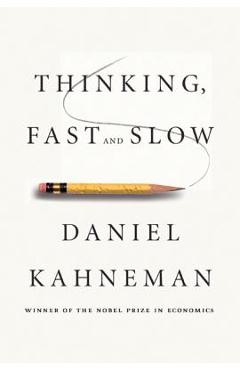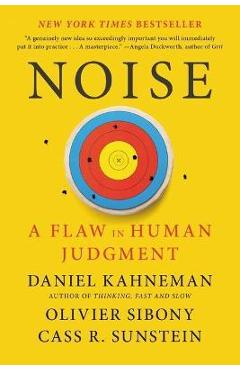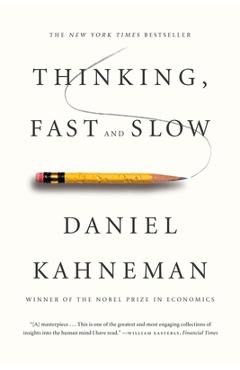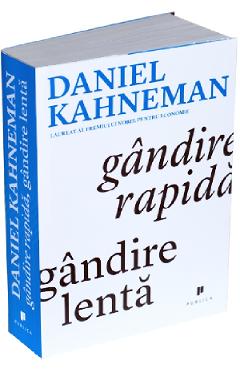Noise: A Flaw in Human Judgment - Daniel Kahneman
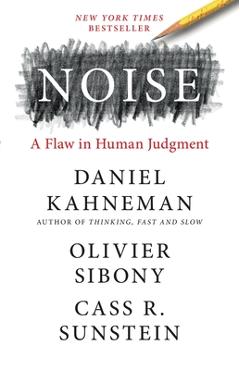
Detalii Noise: A Flaw in Human
Vânzător
libris.ro
Pret
212.16 Lei
212.16 Lei
235.73 Lei
Categorie (vânzător)
Psychology
Marca
Daniel Kahneman
Descriere YEO:
Descriere magazin:
From the bestselling author of Thinking, Fast and Slow, the co-author of Nudge, and the author of You Are About to Make a Terrible Mistake comes Noise, a groundbreaking exploration of why people make bad judgments, and how to control both noise and cognitive bias. Imagine that two doctors in the same city give different diagnoses to identical patients--or that two judges in the same courthouse give different sentences to people who have committed the same crime. Suppose that different food inspectors give different ratings to indistinguishable restaurants--or that when a company is handling customer complaints, the resolution depends on who happens to be handling the particular complaint. Now imagine that the same doctor, the same judge, the same inspector, or the same company official makes different decisions, depending on whether it is morning or afternoon, or Monday rather than Wednesday. These are examples of noise: variability in judgments that should be identical. In Noise, Daniel Kahneman, Olivier Sibony, and Cass R. Sunstein show how noise helps produce errors in many fields, including medicine, law, public health, economic forecasting, food safety, forensic science, bail, child protection, strategy, performance reviews, and personnel selection. And although noise can be found wherever people make judgments and decisions, individuals and organizations alike commonly ignore its role in their judgments and in their actions. They show noise neglect. With a few simple remedies, people can reduce both noise and bias, and so make far better decisions. Packed with new ideas, and drawing on the same kind of diligent, insightful research that made Thinking, Fast and Slow and Nudge groundbreaking New York Times bestsellers, Noise explains how and why humans are so susceptible to noise in judgment--and what we can do about it. From the bestselling author of Thinking, Fast and Slow, the co-author of Nudge, and the author of You Are About to Make a Terrible Mistake comes Noise, a revolutionary exploration of why people make bad judgments, and how to control both noise and cognitive bias. Imagine that two doctors in the same city give different diagnoses to identical patients--or that two judges in the same courthouse give markedly different sentences to people who have committed the same crime. Suppose that different interviewers at the same firm make different decisions about indistinguishable job applicants--or that when a company is

Noise: A Flaw in Human - Disponibil la libris.ro
Pe YEO găsești Noise: A Flaw in Human de la Daniel Kahneman, în categoria Psychology.
Indiferent de nevoile tale, Noise: A Flaw in Human Judgment - Daniel Kahneman din categoria Psychology îți poate aduce un echilibru perfect între calitate și preț, cu avantaje practice și moderne.
Preț: 212.16 Lei
Caracteristicile produsului Noise: A Flaw in Human
- Brand: Daniel Kahneman
- Categoria: Psychology
- Magazin: libris.ro
- Ultima actualizare: 28-10-2025 01:22:05
Comandă Noise: A Flaw in Human Online, Simplu și Rapid
Prin intermediul platformei YEO, poți comanda Noise: A Flaw in Human de la libris.ro rapid și în siguranță. Bucură-te de o experiență de cumpărături online optimizată și descoperă cele mai bune oferte actualizate constant.
Descriere magazin:
From the bestselling author of Thinking, Fast and Slow, the co-author of Nudge, and the author of You Are About to Make a Terrible Mistake comes Noise, a groundbreaking exploration of why people make bad judgments, and how to control both noise and cognitive bias. Imagine that two doctors in the same city give different diagnoses to identical patients--or that two judges in the same courthouse give different sentences to people who have committed the same crime. Suppose that different food inspectors give different ratings to indistinguishable restaurants--or that when a company is handling customer complaints, the resolution depends on who happens to be handling the particular complaint. Now imagine that the same doctor, the same judge, the same inspector, or the same company official makes different decisions, depending on whether it is morning or afternoon, or Monday rather than Wednesday. These are examples of noise: variability in judgments that should be identical. In Noise, Daniel Kahneman, Olivier Sibony, and Cass R. Sunstein show how noise helps produce errors in many fields, including medicine, law, public health, economic forecasting, food safety, forensic science, bail, child protection, strategy, performance reviews, and personnel selection. And although noise can be found wherever people make judgments and decisions, individuals and organizations alike commonly ignore its role in their judgments and in their actions. They show noise neglect. With a few simple remedies, people can reduce both noise and bias, and so make far better decisions. Packed with new ideas, and drawing on the same kind of diligent, insightful research that made Thinking, Fast and Slow and Nudge groundbreaking New York Times bestsellers, Noise explains how and why humans are so susceptible to noise in judgment--and what we can do about it. From the bestselling author of Thinking, Fast and Slow, the co-author of Nudge, and the author of You Are About to Make a Terrible Mistake comes Noise, a revolutionary exploration of why people make bad judgments, and how to control both noise and cognitive bias. Imagine that two doctors in the same city give different diagnoses to identical patients--or that two judges in the same courthouse give markedly different sentences to people who have committed the same crime. Suppose that different interviewers at the same firm make different decisions about indistinguishable job applicants--or that when a company is

